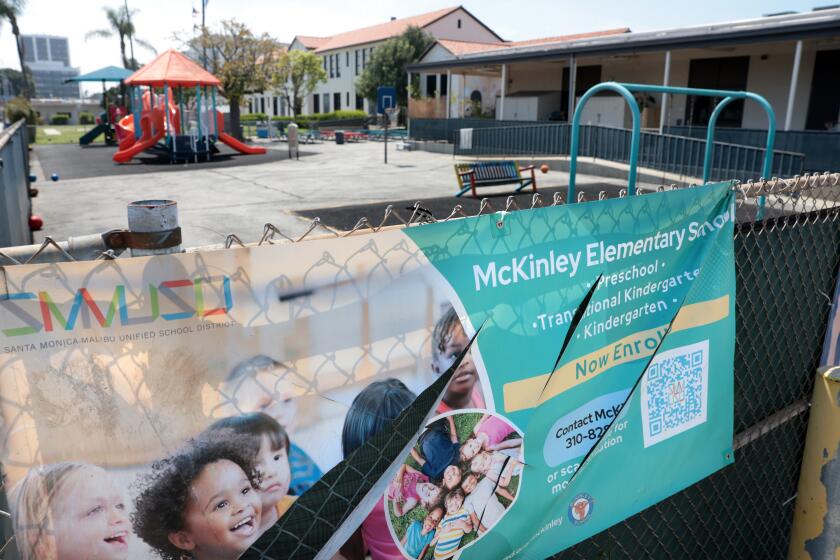Kindergarten’s Not Mandatory but It’s Crucial
Maureen Coleman, a veteran first-grade teacher at Forty-Ninth Street Elementary School in South-Central Los Angeles, can spot them, even on the first day of school.
They might cry when their parents leave. Or they hold their books upside down. When the teacher tells them to line up, they don’t know what that means. They might look at their pencil quizzically, or wander away from the reading circle in the middle of a story.
In California, 46,000 youngsters--10% of kindergarten-age children--skip kindergarten each year because the law doesn’t make education compulsory until age 6.
First-graders who don’t go to kindergarten are typically behind their peers in their academic and social development, and are more likely to flunk a grade in elementary school, educators say.
Teachers say that many of the late-starters are the children of new immigrant families who are unfamiliar with the U.S. education system and have trouble navigating school district bureaucracies. Some parents’ work schedules don’t mesh with their children’s class times.
Whatever the reason, the students don’t enroll in kindergarten, and “they have trouble adjusting, not just academically, but socially,” in first grade, Coleman said. Down the hall from her class, in Gail Lonseth’s kindergarten class, you can see what they missed. Lonseth starts drilling her students as soon as they settle into her classroom.
“The name is Y and the sound is yak, yak, yak!” the children call out in unison. “The name is S and the sound is sssss!”
The trouble is, making kindergarten mandatory costs money. Analysts at the state Department of Finance estimated that requiring all 5-year-olds to go could cost state and local agencies an extra $460 million a year.
Some experts say kindergarten is so important that it should be extended from half a day to a full school day. But that, too, would be expensive, as districts would have to double their kindergarten classroom space.
Those financial realities, at a time when the state is staring at a $27-billion budget shortfall, have led state legislators to temper their calls for kindergarten reform.
A bill now before Gov. Gray Davis, AB 634, originally was intended to make kindergarten compulsory for all 5-year-olds. But now the bill, which was introduced by Assembly Speaker Herb Wesson (D-Culver City), would require only that children who have already attended for more than 30 days continue to attend kindergarten.
“Compulsory, full-day kindergarten is the lost soul of public education,” said Bruce Fuller, an education professor at UC Berkeley. “It’s always been beneath the radar.”
But Fuller said that a statewide push for universal preschool could prompt kindergarten reform. Last month, a Los Angeles County commission resolved to spend $100 million in tobacco tax money on a massive preschool program. And in July, the Los Angeles Unified School District’s Board of Education voted to add an $80-million early childhood education program to a November ballot issue.
Proponents of mandatory full-day kindergarten are using many of the same arguments that preschool advocates have used: For many single-parent families and families with two working parents, half-day kindergarten is not an option. And studies show that children who go to full-day kindergarten do better academically.
“Kids that go to full-day kindergarten are about three months ahead in their cognitive development than kids who go to half-day,” Fuller said. “They’re doing things like identifying letters and learning their numbers.”
At Cienega Elementary in West Los Angeles, Principal Lynn Brown said of half-day classes, “I just don’t think it’s adequate. We need to be able to give them more than what we give them now.”
Part of the problem is that many parents don’t realize how important kindergarten is.
At Forty-Ninth Street Elementary, Principal Georgina Munoz said she can’t help but notice that a number of children come to her school without having gone to preschool or kindergarten.
“Maybe it’s a lack of information on the part of the families,” she said. “Maybe they don’t know how important it is for their kids to be here.”
Munoz said that 92% of her students are Latino, and of those, only 20% are fluent in English. The bulk of those students who are still learning English are in the lower elementary grades; kindergarten is especially important for those immigrant children.
With the state’s new academic standards, kindergarten is far more rigorous than it used to be.
“The pacing is very quick--we don’t have a second to spare,” Lonseth said.
She said although it is challenging to cram in enough information in three or four hours, she doesn’t see how any child could succeed without such preparation.
“It’s impossible for them to do well in first grade without kindergarten,” she said. “They just have to make kindergarten mandatory.”
More to Read
Start your day right
Sign up for Essential California for news, features and recommendations from the L.A. Times and beyond in your inbox six days a week.
You may occasionally receive promotional content from the Los Angeles Times.






